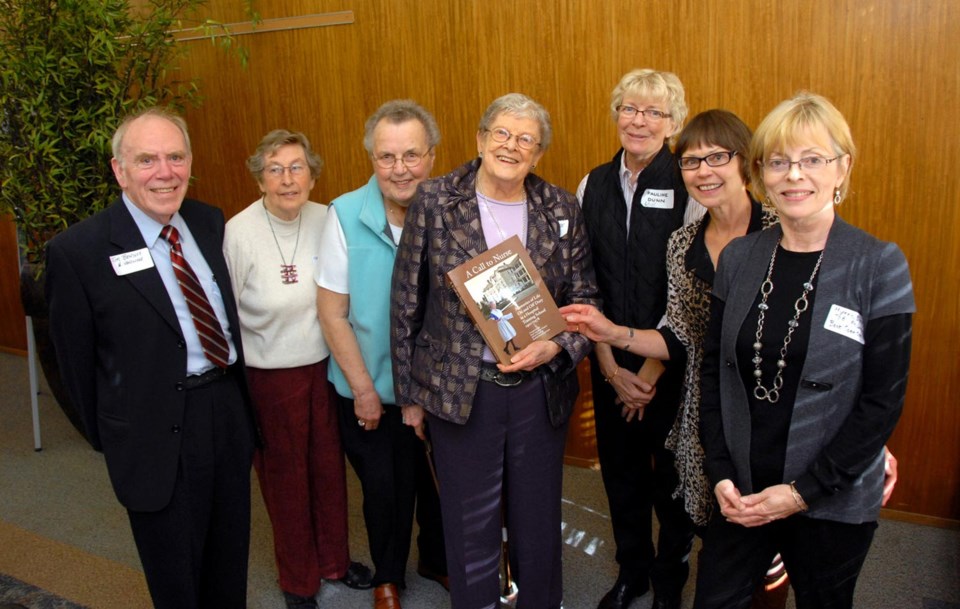For five years Elaine Olson carried with her an idea – an idea she patiently waited until 2005 to share with her fellow Royal Columbian nursing school alumnae.
It had been almost 30 years since Royal Columbian Hospital shut down its School of Nursing and Olson – a longtime Agassiz resident – was looking for a way to collect the memories of the students who attended the school.
“We were anxious to preserve the history as none of us were getting any younger and we were losing some of our members,” said Betty Archer, one of the alumnae committee members who helped turn Olson’s idea into a reality. “It was really Elaine’s (Olson) idea. She carried the idea from 2001 and we didn’t act on it until 2007.”
In 2007, two years after Olson presented her idea to the School of Nursing alumnae committee, Myrna Bloch, from Langley, Marie Bensley, from North Vancouver, and Pauline Dunn, from Surrey, joined Olson and Archer – the official book committee was born.
For the next six years, the women met on a regular basis to discuss their research and the book’s progress.
“As we got going, because none of us had written before, … it took us two years to gather all the classes’ (information),” Bensley said.
But as they went about interviewing alumnae, what seemed like an enormous undertaking became an exciting journey down memory lane.
“It was great fun. We got people talking to each other who hadn’t been in touch,” Bensley said.
On Oct. 27, ACall to Nurse was released. The book features a different chapter for each decade the school was open and includes stories, pictures and tokens from the old nursing school. While the book was mainly created to catalogue the memories of alumnae, it also explores themes about life that transcends time.
“Young people starting a new career, a new way of life, naturally have the same fears today as they did then,” said Bensley.
A Call to Nursetells the tale of 2,500 students who traveled from all over the Lower Mainland and Canada to study at Royal Columbian Hospital’s School of Nursing. Many of the stories are similar to the experiences of the women who wrote the book, which makes it even more special, said Pauline Dunn.
“It was so interesting that many of the stories rung abell with everyone,” Dunn said. “I was (a student in the) late ‘60s and things were very similarly run in the hospital and in the school of nursing as they were in the ‘30s.”
While the school hierarchy and organization remained the same for almost its entire existence, the amount of preparation the classes received increased year to year, remarked the women.
“The medicine and the diagnostics became so much more complex. Nurses needed to know how to handle all of that and to be able to use intravenous and to do things that we didn’t have to do when we first started,” Dunn said.
The emphasis was on learning by doing and many of the alumnae on the committee recall working in the hospital in their first few days of school.
“You came in, got a uniform, and they sent you on the floor to wash the shelves and clean up. Gradually, you caught on what you were supposed to do and people showed you as you went along,” Dunn said.
In the early years of nursing schools in Canada, the women who enrolled were part of an apprenticeship-style program that trained and educated them in exchange for labour. The students would work long hours in the hospital in order to gain the experience and expertise required to graduate and get a job.
Olson and Bloch enrolled in the Royal Columbian Hospital School of Nursing in 1967 for the cost of $200, which included textbooks, uniforms, and room and board for all three years of the program.
“You were totally looked after,” Olson said.
But in exchange for the relatively inexpensive tuition, the students were expected to work hard.
The committee said the school was very militaristic in the way it was run.
Head nurses would scour the hospital, checking to make sure the students had arranged the rooms exactly right. Dust or ill-folded sheets were means for punishment back in the day, Bloch said.
But as the prologue states, “besides learning to nurse, they established lifelong friendships.”
The committee – who dedicated six years to this endeavour – couldn’t agree more.
For more information on the book, visit www.fraserhealth.ca or email [email protected] to place an order.



